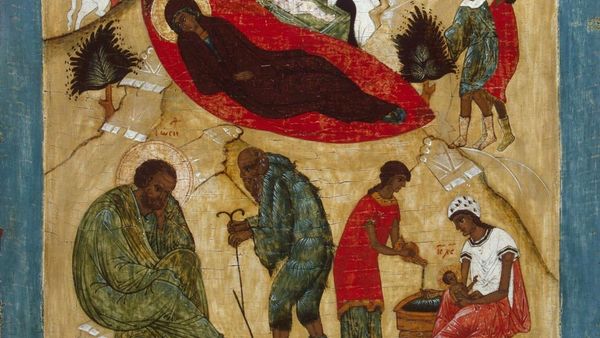It would be strange to write just about anything without attending to the anxiety that so many of us are experiencing right now. We tremble from the fear that our loved one might succumb to an illness, denied medical care not out of cruelty but because there are no hospital beds or ventilators. We long for contact with our families and our friends, and yet the evil of this illness, this sickness, is that we must stay away, shut off from the very communities that support us. We worry about whether we can pay the bills not just this week, but the next—whether we will be able to feed our families. And we wonder how long we will need to stay away from eating and drinking the Body and Blood of our Lord, how long we will be unable to offer that sacrifice of praise in our parish church.
There is a pious, albeit false narrative, that you should have no fear at all. If you have faith, then none of these things should matter. After all, our Lord has risen from the dead, he has conquered sin and death, and he will heal us too. If only if we have faith, then everything, absolutely everything will be OK.
But this is not what Christ’s Resurrection means. When our Lord rose from the dead on that first Easter morn, when light shone into the darkness of despair, our Lord did not promise that all sorrow, all tears would immediately be wiped away. In fact, for those who believe in the gift of the Resurrection, that our Lord has risen from the dead, forever changing what it means to be God and human alike, the tears will flow even more. We recognize the fullness of the delight of human life, because we believe that the Word became flesh and dwelt among us. All that it means to be human, all the tears and joys, have been taken into the very heart of God. We cry, we worry, we fret this day because we know that this life is fundamentally beautiful:
The God who was born in a stable,
who trekked the dirty road from Bethlehem to Egypt,
who grew in wisdom and strength in the presence of his beloved parents,
who kept vigil along the bedside of dying St. Joseph, his beloved earthly father,
who savored the delights of friendship with his disciples,
whose heart was moved to compassion by the suffering of the hungry, the
thirsty, and the sick,
who endured all the evil that human beings might heap upon him as he carried
the cross to Golgotha,
who offered a tender goodbye to his mother and the beloved disciple,
who rose from the dead, ascended into heaven, and now sits fully human and
fully divine,
has made this life of ours, this perilous and contingent life, forever and
remarkably beautiful.
Fundamentally, this is what we are talking about when we speak about the evangelization of culture. Through the Gospel, what it means to be human, has forever changed. If you look at the fallen human condition, it may be hard to see it. What we see, if we look at the news or our Twitter feed right now, is something else. We see those who care only about themselves, who seek to grasp as much food, as much toilet paper, as much stuff as possible to save themselves. We see those who have little concern for the common good, interested more in enjoying one last night of partying, before the world shuts down. We see journalists that are sometimes savoring their nightly reports, enjoying the crisis they are covering, aware that nothing raises ratings and thus advertising dollars more than fear. We see men and women dismissing this illness as overblown, a self-created crisis introduced only for political reasons.
What we often see, although not exclusively—we also see Italians singing from balconies, human beings joining together in friendship across isolation—is the precipitation of hatred and fear, violence and death, a hellish logic governed by scarcity and self-interest rather than the self-emptying generosity of the kingdom. And yet, earlier this week, on the feast of St. Patrick, we heard another logic—one not governed by hatred but divine love. “We know that we have passed out of death into life, because we love the brethren. He who does not love remains in death” (1 John 3:14). We Christians, those of us who have died to the logic of sin and death, risen anew with Christ, cannot remain entrapped in death. We cannot sit by as the world delights in this death-dealing logic, this vitriol of hatred and blame. We must be slaves, servants, of divine love alone. We must invite the world to see the beautiful gift of life, a gift that right now we recognize as so precarious, so contingent, so ash to ash, dust to dust.
Months ago, I was asked to address the life of St. Kateri, the Lilly of the Mohawks for the feast of St. Patrick, the apostle to the Irish. How fitting that we turn our attention to these saints in this time. St. Kateri suffered from ill-health her entire life, scarred from the age of four by smallpox. And yet, during a suffering that never disappeared, a life of conversion and penance that drew the ire of her parents, she found a love that made sense of her whole life. It was the love of Christ, a love that she pledged herself to at the age of 19. It was the very love that had led her to serve the wounded in battle at the age of 14, to care for the sick, a love that at last had a name: “Jesus.”
St. Patrick was initially captured as a slave, taken to Ireland, eventually escaped, only to receive a vision to come back and announce the Gospel to those who were once his captors. In his Confession, Saint Patrick writes about this act of strange and puzzling love, “Today I can offer him sacrifice with confidence, giving myself as a living sacrifice with confidence, giving myself as a living victim to Christ, my Lord, who kept me safe through all my trials.”
Dear friends, the task to evangelize culture, to create a space of divine love in a world often governed by a logic of scarcity, a libertarian logic where there is nothing more than the individual and his or her needs, is still ours. The thing about this virus, this disease, is that it is so very clear what we must do. We must love our neighbor. We must introduce into the lives of those shut in, the elderly and the sick, a bit of hope. We must call them, be with them in their suffering, trek out to the grocery store so that they might have supplies. We must stay away from public gatherings, not because we are all worried about our own health. We stay away because we could be a carrier of the illness, we could take away the lives of our brothers and sisters in Christ. We must be patient with one another, especially our children—we have unexpectedly become their teachers. We must practice the very self-emptying love, the love unto the end, that is the meaning of Christian life. It is this love that makes this life so dreadfully beautiful in the first place.
Of course, most of us, will be practicing this love without that sustaining sacrament of the Eucharist. Maybe for a couple weeks, maybe right into the midst of the Easter season, maybe longer. Undoubtedly, this will sadden us a good deal. And yet, we are not left bereft. Not only do we have the prayers of the Church, the Scriptures, the psalms, the sacramentals, and Mass beamed around the world, we still have that sacrifice of the Mass even when we are not there. The Mass is a sacrifice, a sacrifice of the whole Christ, head and members, offered each day around the world. When that sacrifice is offered, it is us on that altar, even when we are not there. It is the body of all Christians, those full of joy and suffering, even those dying on their hospital beds, offered back to the Father.
These days, we should remember that. We baptized Catholics can no more escape participation in the Eucharist than we can escape our human bodies. When the Church offers this sacrifice of love, when Christ becomes present, he offers us. This day, our task, is to become this offering of love. To care for the sick and the hungry, to create spaces of generosity and love, in a world of scarcity. To save money for those who cannot pay bills, to cook for those who cannot, to come together in love.
In the end, dear friends, you cannot end the anxiety. You cannot squelch fear with a bit of pious sentiment. What we can do is rely absolutely, entirely on a love that is not our own. It is the love of the Word made flesh, the splendor of the Father, who dwells among us even in our isolation for the common good. It is time to call out the lie of a kind of individual liberty that thinks only of my well-being, my safety, even the flourishing of only my family. We are neighbors, neighbors knit together in a common humanity, a humanity that the Son of God knit himself to in love. If we want to become like him—and if Lent is about anything it is about that—we must be willing to live that logic of love unto the end.
And when we do, we create a space of divine love in our communities and beyond, a space of love (just like those created by St. Kateri and St. Patrick) that will spread around the world, infecting the world not with sickness but a graciousness, a kindness, a goodness that restores the whole world to its original vocation. This is our task, not just for the rest of a Lent that may last longer than we imagined. But for the rest of our days. St. Kateri, St. Patrick, all you holy men and women, pray for us.


